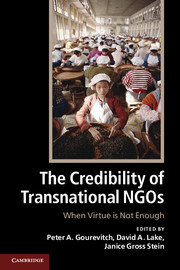6 - In defense of virtue
credibility, legitimacy dilemmas, and the case of Islamic Relief
from Part II - Humanitarian NGOs
Published online by Cambridge University Press: 05 June 2012
Summary
Humanitarian organizations, like most virtuous organizations, help us live an ethical life. It is often impossible practically, or prohibitively expensive, to do the right thing on our own. Many of us are deeply concerned about human suffering in places like Darfur, but cannot directly help these distant strangers. Instead the most that we can do is support humanitarian agencies that have the desire and the capacity to act in ways that are consistent with our values. By supporting humanitarian organizations we turn them into our ethical agents. We contribute to humanitarian organizations because we believe both in what they stand for and that they can and will do what they promise.
What happens to virtuous organizations when beliefs about their values and their effectiveness are shaken or can no longer be sustained by faith, when their legitimacy and their credibility are questioned? For much of their history humanitarian organizations were credible in large part because they were legitimate, a legitimacy based largely on their social purpose. Acting in the name of humanity and according to universal principles, they were helping the world’s most vulnerable populations. Yet over the last several decades the “virtue” of humanitarian organizations has been challenged; whether their actions are truly consistent with the values of the international community – a question of legitimacy – and whether they can credibly carry out their stated goals – an issue of credibility – came into question.
- Type
- Chapter
- Information
- The Credibility of Transnational NGOsWhen Virtue is Not Enough, pp. 137 - 164Publisher: Cambridge University PressPrint publication year: 2012
- 9
- Cited by

